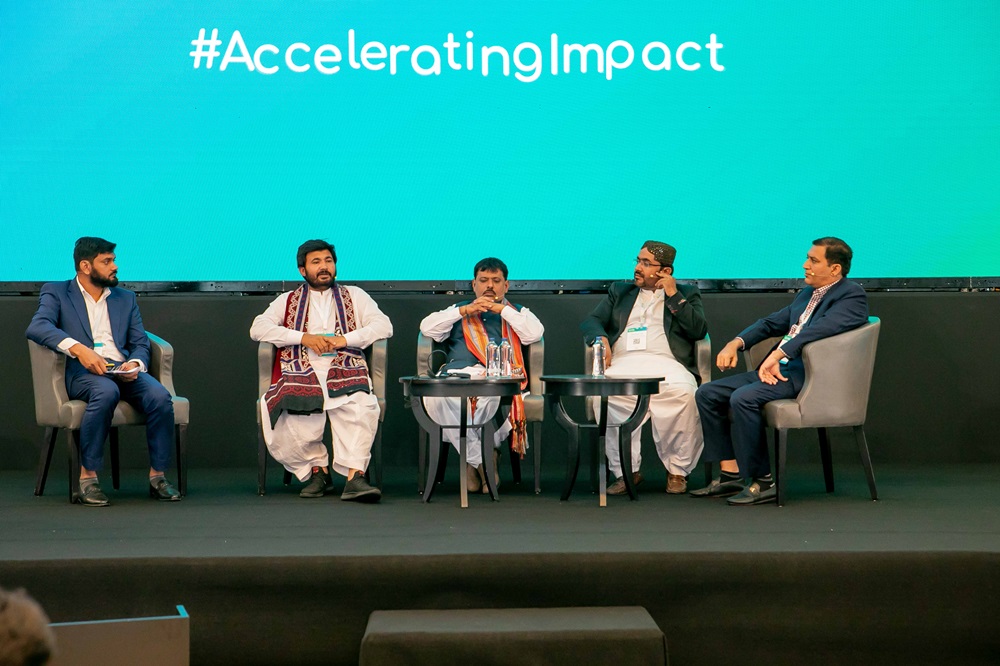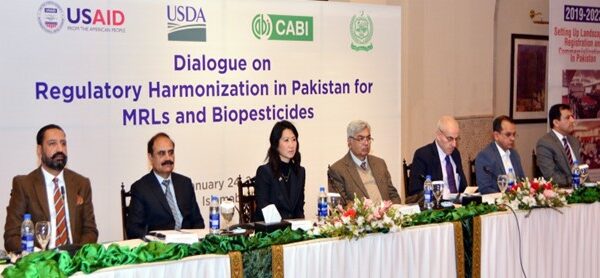
Sindh farmer Fateh Muhammad Laghari has gained recognition for his commitment to sustainable cotton farming practices as part of the Better Cotton Member Awards held during the organization’s conference in Istanbul, Turkey.
Mr Fateh is a 40-year-old married farmer and father of two children from Shero Sherani village in Chamber Taluka, Tando Allahyar District of Sindh, Pakistan.
He has overcome numerous challenges in cotton cultivation on his 20-acre farm where he also cultivates vegetables, including onion and tomato. However, by adopting sustainable farming practices, he has emerged as a leader in his community.
Indeed, his dedication to sustainable farming did not go unnoticed. After a thorough evaluation, CABI selected him to attend the annual Better Cotton Conference where he was recognized for his leadership and commitment to sustainable practices.
These include using certified and registered seed varieties, adopting compost technology such as farmyard manure to improve soil health as well as reducing his use of less environmentally friendly and safer to use synthetic fertilizers.
Furthermore, Mr Fateh is a champion of more sustainable biological control methods to tackle pests on his farm. For instance, he uses yellow sticky traps and pheromone traps to monitor pest populations in the field. By doing so, he is helping to protect the environment and improve soil health.
Mr Fateh’s seven-year journey reached a pivotal moment when the CABI team from Pakistan visited his village and selected him as a Lead Farmer for the Better Cotton initiative. This opportunity allowed him to represent his community on an international stage, where he shared his experiences and learnt from global experts.
Exemplary leadership and commitment to sustainable practices
Better Cotton is a global effort to enhance the sustainability of cotton production. Launched in 2009, the initiative aims to improve environmental, social, and economic aspects of cotton farming.
Through this programme, farmers are encouraged to adopt more efficient practices that reduce water consumption, minimize harmful chemical use, and improve soil health.
Social, environmental and economic criteria considered
As part of Better Cotton, CABI is working with several small and medium farmers at field level in two of the major cotton-growing regions in Pakistan, Sindh and Punjab. CABI is supporting these farmers to produce better cotton that takes social, environmental and economic criteria into account.
Mr Fateh said, “My journey in cotton farming has been demanding, but being chosen by CABI as a Lead Farmer was a turning point. The support from CABI and Better Cotton in adopting natural farming methods has been invaluable, and the experience has been truly rewarding.”
For farmers like Mr Fateh, these initiatives are critical in transforming their farming methods. Prior to joining the Better Cotton project, Mr Fateh faced numerous challenges, including low crop yields, deteriorating soil health, and the high cost of inputs.
Traditional farming methods were not yielding sufficient results, and many local farmers were similarly struggling. However, the training and resources provided through CABI and Better Cotton have helped Mr Fateh transition to more sustainable and cost-effective practices.

“Transitioning to sustainable practices was challenging at first, but with CABI’s support, I started seeing the benefits,” said Mr Fateh. “My soil improved, and I could reduce the amount of expensive chemical inputs while maintaining good yields.”
Mr Fateh is earning around 115,662 PKR per acre. Thanks to sustainable practices, including better seed selection, his total income for 2023 was 2,315,000 PKR from his 20-acre cotton farm.
This income helps him save for seasonal crops, manage household expenses, and provide for his children’s education.
Sustainable farming practices is central to the success
The importance of pilot projects in promoting sustainable farming practices is central to the success of the Better Cotton initiative. These smaller-scale initiatives allow the program to refine strategies tailored to local conditions and needs.
In Mr Fateh’s case, the pilot project in Sindh offered him and his fellow farmers the opportunity to test out sustainable farming techniques, which not only improved productivity but also fostered greater environmental stewardship in the region.
When Mr Fateh received the invitation to the Better Cotton Conference, he felt both thrilled and honoured. “It felt as though all the hard work we invested in our farming practices was finally being acknowledged. I was eager to learn from others and bring back new ideas to enhance our local farming,” he said.
At the conference, Mr Fateh participated in key sessions and workshops, interacting with farmers, industry experts, and policymakers from around the world. The experience broadened his perspective on sustainable cotton farming and allowed him to exchange ideas with peers from different countries.
He also learned about various farming techniques, the challenges faced by farmers in different regions, and how collective efforts could help mitigate these issues.
Role CABI played in supporting transition to sustainable cotton
Mr Fateh also presented his own success story at the conference, highlighting the role that CABI played in supporting his transition to sustainable cotton farming. His presentation focused on the natural methods he had implemented on his farm, from sowing to harvesting, and the positive impact these techniques had on his farm’s productivity.
“The response from my community has been very encouraging. Many farmers are interested in learning more about the new practices I’ve introduced,” he said. “I plan to organize local meetings and workshops to share what I’ve learned so that we can all benefit from these sustainable practices.”
Dr Habat Ullah Asad, CABI’s Project Manager for Better Cotton, said Mr Fateh’s participation in the BCI conference has had a profound impact not only on his personal and professional development but also on the broader farming community.
Dr Habat Ullah Asad said, “His work now serves as an inspiration to others, showing how sustainable farming can lead to better yields, healthier environments, and improved livelihoods.
“Looking ahead, Mr Fateh remains committed to advancing sustainable cotton farming in his region. He acknowledges that continued support is necessary to implement these changes fully, especially in terms of resources and training, but he remains optimistic about the long-term benefits,” he said.
During the Better Cotton Member Awards, CABI was also honoured with the ‘Global Innovators Award’ in recognition of its work to positively impact farmers, fostering sustainable practices and improving livelihoods.
Additional information
Main image: Mr Fateh Muhammad Laghari (third from right) at the Better Cotton Member Awards.
Project page
Find out how CABI is supporting farmers to produce better cotton in Pakistan from the project page here.
Relevant stories
‘CABI wins Global Innovators Award at Better Cotton Conference 2024.’
‘Workshop reviews Pakistan’s organic policy plans for more sustainable food and cotton production.’
2 Comments
Leave a Reply
Related News & Blogs
Empowering farmers through digitalisation: Strengthening the future of the cotton industry
When it comes to farmer advisory, are we really able to advise? That was the question posed to Katherine Cameron, CABI’s Head of Digital Advisory Tools, at the Better Cotton Conference 2025 which took place recently in Izmir, Turkey. The responsibility…
24 June 2025





Nice example/inspiration for other cotton growers too.
An excellent example of constructive collaborative support which is admirable. It needs broader replication to other parts of Pakistan also.